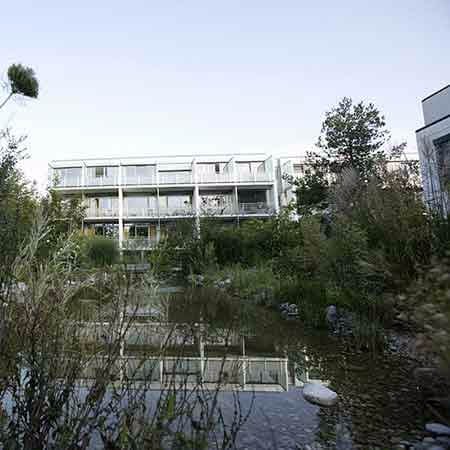A varicocele is a common urologic disease that causes infertility and hypogonadism (impaired production of sex hormones). The condition is mostly left-sided, while bilateral or right-sided forms of the disease are less common. The reproductive function of men with bilateral extension of the veins of the spermatic cord is the most affected. If you have been diagnosed with a varicocele and there are indications for surgery, you can undergo your treatment abroad. Doctors at modern hospitals perform minimally traumatic, reliable, and safe operations that permanently eliminate varicocele, help restore reproductive function, and hormonal levels. You are welcome to use the Booking Health service to find out the cost of treatment and choose a medical care program at the best price.
Content
- Diagnostics of varicocele
- Who may need varicocele treatment?
- Varicocele treatment options
- Where is it best to treat your varicocele?
Diagnostics of varicocele
A varicocele does not cause any symptoms in most men. The condition is detected during a preventive examination (scrotal palpation) or during infertility diagnostics. Some men with a varicocele seek medical attention as they feel pain and discomfort in their scrotum.
Diagnostics of the disease begin with a clinical examination. A doctor palpates and examines the scrotum in different positions of the body and with straining. Clinical diagnostics allow healthcare professionals to not only establish the presence of a varicocele but also determine the side of the lesion and the severity of the disease.
When preparing a patient for treatment, doctors conduct ultrasound diagnostics, including Doppler ultrasonography, color flow mapping, and elastography.
The degree of influence of a varicocele on hormonal levels and reproductive function is assessed with the following laboratory diagnostics: a spermogram to assess sperm quality, as well as testosterone blood tests and FSH and LH blood tests.
Who may need varicocele treatment?
10-15% of all men have a varicocele. The very fact of its detection is not a reason for the operation. A varicocele usually does not cause any discomfort and often does not significantly affect the quality of sperm or sex hormone levels in the blood.
Indications for the treatment of the disease in adult men are as follows:
- testicular atrophy (significant shrinking of the testicular volume);
- pain and discomfort in the scrotum, and other symptoms;
- deterioration of sperm quality if a man has reproductive plans in the near or distant future;
- low testosterone levels in the blood (the operation eliminates the need for a person to receive lifelong sex hormone replacement therapy).
The indication to treat the condition in adolescents is disorders of sexual development or the absence of testicular growth in accordance with age norms.
If the goal of treatment for a patient is to restore reproductive function, the operation should be performed as soon as possible. Until the extension of the veins is eliminated, the results of the spermogram will continue to deteriorate. The later the condition is treated, the less the results of the spermogram will improve and the lower the chances of restoring reproductive function.
Varicocele treatment options
Dozens of surgical interventions have been developed for the treatment of varicocele. Their essence is similar, as it is necessary in one way or another to stop the flow of blood through the dilated veins. The effect can be achieved by ligation, intersection, clipping, blood vessel embolization, etc. Operations also differ in the type of their surgical approach. Surgeons can use inguinal, subinguinal, retroperitoneal, abdominal, laparoscopic, or endovascular approaches. Some surgical procedures can be performed with microsurgical techniques. The tactics are also different in relation to other structures of the spermatic cord. It can be completely tied up, although more often than not, only a vein is isolated and tied up, since it is safer and reproductive function can be better restored.
Given below are some of the most common treatment options:
Marmar surgery is performed through an incision in the groin that is 3 cm long. Doctors ligate the dilated vein. Doctors at foreign hospitals use microsurgical techniques to clearly see all the structures of the spermatic cord and avoid damaging them. This is a safe and minimally traumatic operation, after which patients do not require any hospital stay. The risk of a recurrence does not exceed 0.8%. The effect is achieved in 90% of cases.
Laparoscopic varicocelectomy is a more reliable, but also more traumatic, intervention. The operation is performed through short (0.5 cm long) abdominal incisions. At the same time, this is a more sparing surgical treatment option compared to outdated open operations through an abdominal approach (a long abdominal incision).
The operation is performed with thin and long instruments under the guidance of a tiny video camera. There is therefore no need for a surgeon to immerse his hands in the wound during the intervention. During the surgical procedure, the dilated vein is isolated and clipped or ligated.
This is the most effective surgical intervention for a varicocele, providing a good result in almost 100% of cases. This operation is often used for bilateral varicose veins. At the same time, this operation is more traumatic than one done through an inguinal approach. It is performed under general endotracheal anesthesia and requires a patient to stay at the hospital for several days.
Endovascular treatment involves embolization (blocking) of the testicular veins from inside the blood vessels. Endovascular treatment is technically complex but minimally traumatic, safe, and reliable. In standard cases, doctors perform a femoral vein catheterization through an incision in the groin area. With the introduction of a contrast agent and X-ray scanning, they carefully evaluate the structure of the venous network and then clog the dilated veins and their satellites with solid particles. The technical success of the procedure is achieved in more than 90% of cases. A few failures are associated with the peculiarities of the structure and location of the blood vessels. In such situations, a varicocele can be treated with different techniques or endovascular embolization can be performed through other veins, for example, the subclavian vein.
Occasionally, other types of surgical procedures can be used as well. For example, a retroperitoneal approach is considered one of the safest for children, but it poses a high risk of varicocele recurrence (about 15%).
Where is it best to treat your varicocele?
You can undergo your treatment abroad at one of the best hospitals in the world. On the Booking Health website, you can find out prices and choose the most suitable medical center. There are a few reasons for you to undergo your treatment abroad. These are as follows:
- high-precision diagnostics allows doctors to choose the best treatment option for the disease, taking into account the patient's age, the severity of the disease, reproductive function, and peculiarities of the location of blood vessels;
- modern and well-equipped hospitals;
- innovative methods, such as a microsurgical technique, laparoscopy, endovascular embolization, and intraoperative fluorescence diagnostics;
- a low risk of complications.
You are welcome to use the Booking Health service to find out the cost of treatment and make your appointment at a hospital. The website offers the best hospitals in the world and presents the real prices for each type of medical service. You can sort hospitals by the cost of treatment, the nearest possible appointment date, rating, and patient reviews. The specialists from the Booking Health company will advise you on all issues and take care of all the arrangements for your trip. When making an appointment through the Booking Health service, the cost of treatment will be lower for you than when contacting the hospital directly, due to the absence of taxes for foreign patients.
Authors:
The article was edited by medical experts, board-certified doctors Dr. Nadezhda Ivanisova and Dr. Vadim Zhiliuk. For the treatment of the conditions referred to in the article, you must consult a doctor; the information in the article is not intended for self-medication!
Sources:
MedicineNet
















